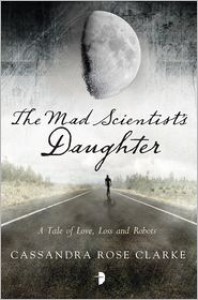The Mad Scientist's Daughter

I’m sort of reluctant to actually write this review. Like the feeling of it will be akin to opening up a vein, or getting punched on an old bruise or something. Which is weird, because the raw-wound nature of the sadness that permeates this book is not something that I’m really familiar with in my real life, so I guess it’s a testament to the power of Clarke’s writing that I feel like just by writing about the things that happened to her characters that I will be exposing myself to those feelings as well. And that’s something I didn’t actually anticipate writing in this review, as I just now realized it while I was typing.
The Mad Scientist’s Daughter is a hybrid speculative fiction, capital ‘R’ romance, mad-scientist fairytale about a robot and the girl who loves him. It’s honestly one of the strangest books I’ve ever read, and it was deeply unsettling in parts, but the overall sum of those parts was a book that is brave and confident and full of deeply felt emotions.The titular mad scientist’s daughter is Catarina ‘Cat’ Novak, whom we follow from the age of five through to adulthood. She lives with her mother and father in a semi-isolated backwoods house in a small town. Her father is well-liked, but also sort of secluded and mysterious when it comes to his work, and her mother is emotionally aloof. One day he brings home a man named Finn and introduces him as Cat’s tutor. Cat is at first deeply suspicious of this new character in her life, but they quickly form a bond, one that makes everyone but her father nervous and uncomfortable. See, Finn is an android, a robot under perfectly manufactured skin; his brain is a computer. This doesn’t matter to Cat as she grows up, but as the story goes along, it’s made abundantly clear that no matter how much Cat (thinks) she sees him as a person, other people do not feel the same way, and that in turn affects the way she sees him and treats him as well. As Cat grows up, Clarke navigates her emotional terrain as she struggles to justify her feelings for Finn as a person, to choose between the things she wants and the things that would seem to make her life easier. I don’t want to say much more, because Cat’s process of self-discovery is the main arc of the book.
I only had a couple of issues with the book, and they’re both sort of related to one another. The first is that, while it was beautiful (the prose is wonderful), the unrelenting sadness in Clarke’s tone got to be a bit much. I needed a little bit of levity here and there, especially near the middle when Cat was having the hardest time. Clarke’s words seeped into my brain and I almost succumbed to Cat’s depression, too. The second thing is Cat herself. And this is something she herself acknowledges by the end of the book, but it didn’t stop me from being annoyed with her when she did really dumb things that hurt the people she professed to love. She was passive to a ridiculous degree, and it was frustrating to read about as it was happening. Aside from that middle part, though, the book is a quick read that packs a powerful punch.
I would definitely recommend this book to almost anyone. I only say ‘almost’ because I’m sure there are people out there who don’t like love stories or stories about robots, but I have a hard time believing those people actually exist. I mean, if you can’t appreciate a good robot story I don’t even know what to do with you.




